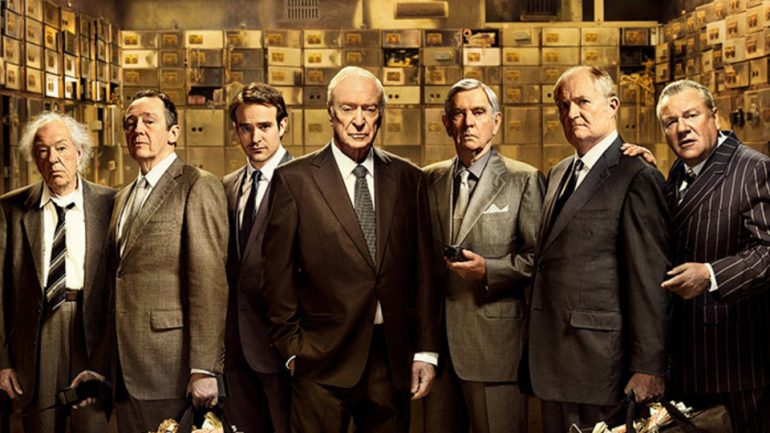King of Thieves
Starring Michael Caine, Tom Courtenay, Jim Broadbent, Ray Winstone, Charlie Cox, and Michael Gambon
Directed by James Marsh
Reviewed by Michael Dalton
[rating: 3/5]
“So that’s how they see us is it? The Lavender Hill Mob?” says an exasperated Brian Reader, the ringleader of a group of retired thieves who conspire to rob the Hatton Garden Safe Deposit in James Marsh’s new film King of Thieves. They’re a geriatric bunch, in their 60s and 70s and at least one, the doddering John Kenny Collins (played by Tom Courtenay), feels that their old age will count for plenty should they be nabbed. And the rest of the group? Terry Perkins, a diabetic, is played with menace by Jim Broadbent, Paul Whitehouse is steely-eyed Carl Wood, Ray Winstone brings the malevolence as Danny Jones, Michael Gambon stumbles about as the incontinent Billy “The Fish” Lincoln, Charlie Cox adds a dash of youth as alarm specialist Basil, and Michael Caine is Reader. Based on true events that took place in 2015 that resulted in the motley crew being labelled “The Diamond Wheezers” by the media after stealing a still undetermined amount (somewhere in the region of 200 million pounds is one figure often bandied about), Marsh could’ve made it tighter (there are moments where it veers toward as much of a stumble as Gambon’s) but in the end it comes together as a deliciously cheery romp that will throw Ealing Studios fans back to the glory days of English cinema. It doesn’t have anywhere near the joy of The Ladykillers or the wickedness of Kind Hearts and Coronets (its too foul-mouthed for that) but the sprit is there.
In heist movies the circling of the mark, the razor sharp choreography of the event, the tension (don’t buy a ticket hoping for too much of that) of the preparation, and the deed itself are all part and parcel of the genre but the treat is of course watching for the mistake. Remember the bird in Topkapi? Disappointingly, King of Thieves doesn’t have such intent. The actual heist is surprisingly the weakest part of the film considering what it must have taken for these men to pull it off. They stop and argue, throw tantrums, and one security alarm rings long enough you half expect the Armed Forces to appear. The pacing seems to have been messed up in the editing suite.
Perhaps Marsh wanted to keep the focus on the age of his players and the inherent jokes rather than their motivation and why, after the robbery, loyalties get so distorted. The joy here is watching the ensemble, in particular Caine, who gives us the iconic Carter (had he lived) more than a few decades down the track, wizened and cagey. If you walk out feeling like it should have had more of a payoff, be grateful that Marsh and screenwriter Joe Penhall pulled their own little stunt here, one that Hollywood wouldn’t consider. They stuck to the story.




